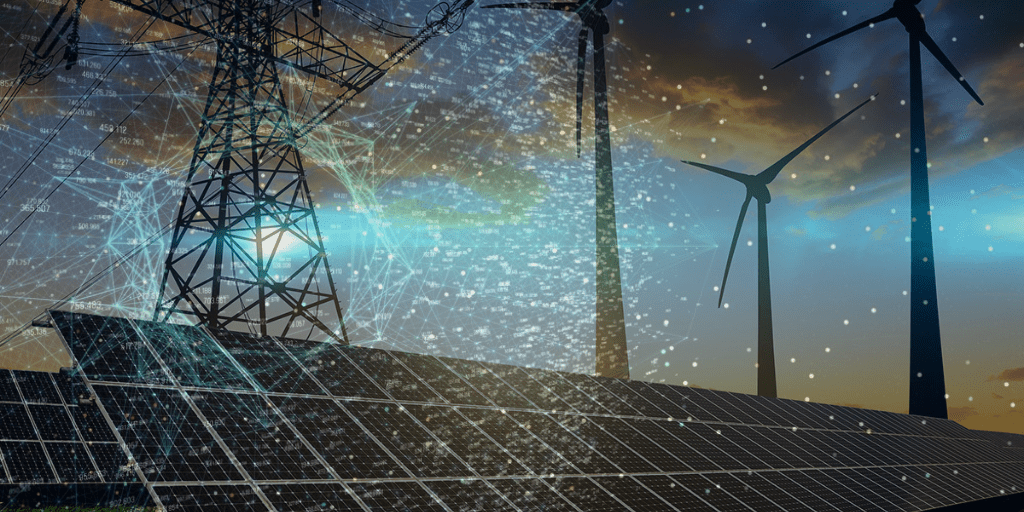Can Blockchain Technology Power the Electricity Grid In The Future?
Earlier this month, under its “The Future of Everything” vertical, The Wall Street Journal described how AI is developing the power grid. The Journal states artificial intelligence is “the key to keeping the lights on.”
The article demonstrates how power companies are “turning to AI, drones, and sensors to curtail outages, save money, and help operate an increasingly complex electricity grid.”
Moreover, by doing so, they cut the recovery time from hurricane-related outages nearly in half in just a little over a decade. Although these improvements are just the start of how AI will maintain the electricity grid of the future, blockchain-enabled artificial intelligence will be a linchpin of the global electricity infrastructure. It’s simple to envision how this will work out.
Solar Panel Prices Collapsing The Cost of Electricity
The energy economy of the future will be sustainable and zero-carbon. The cost per kilowatt-hour of solar energy had fallen below that of gas and coal by 2018. Solar panel costs have gone hyperbolic in the downward direction since the 1970s. Solar prices that were orders of magnitude below 1970s levels fell off dramatically again, in the last 12 years.
The Electricity Grid of The Future
So what purpose do blockchain and artificial intelligence have to perform in this? If you comprehend the trend lines, solar is going to get very affordable. So cheap that the electricity grid will not be a one-way channel from plant to end-user.
Instead, it will be a distributed ecosystem of electricity users or producers. Those who do not utilize all the energy they generate from their solar roof tiles and solar driveway will push it onto the grid. Those who spend their surplus will purchase it from them for a fee.
How Blockchain Will Manage The Power Grid
All of these constant micro-transactions for electricity will be arbitrated and logged by blockchain-powered DAOs (decentralized autonomous organizations). Electricity will become so inexpensive that only micro-transactions will be up to the task of handling the energy economy of the future.
As bitcoin is so electricity-intensive to develop, the Bitcoin economy is sensitive to variations in industrial energy costs. In that, the crypto industry has already noticed the intimate relationship between monetary units of account and electricity.
And with Ethereum, we’ve seen how it’s possible to build distributed, autonomous artificially intelligent systems to handle any digital complex according to a set of proposed rules. That would involve a more sophisticated electrical infrastructure. Blockchain will control the energy economy.
You’ll pay automatically for the energy you utilize, and automatically get compensated for the energy you produce.
Stay informed with daily updates from Blockchain Magazine on Google News. Click here to follow us and mark as favorite: [Blockchain Magazine on Google News].
Get Blockchain Insights In Inbox
Stay ahead of the curve with expert analysis and market updates.
latest from tech
Disclaimer: Any post shared by a third-party agency are sponsored and Blockchain Magazine has no views on any such posts. The views and opinions expressed in this post are those of the clients and do not necessarily reflect the official policy or position of Blockchain Magazine. The information provided in this post is for informational purposes only and should not be considered as financial, investment, or professional advice. Blockchain Magazine does not endorse or promote any specific products, services, or companies mentioned in this posts. Readers are encouraged to conduct their own research and consult with a qualified professional before making any financial decisions.

 Bitcoin
Bitcoin  Ethereum
Ethereum  XRP
XRP  Tether
Tether  Solana
Solana  Dogecoin
Dogecoin  USDC
USDC  Cardano
Cardano  Lido Staked Ether
Lido Staked Ether  TRON
TRON  Avalanche
Avalanche  Chainlink
Chainlink  Sui
Sui  Stellar
Stellar  Wrapped Bitcoin
Wrapped Bitcoin  Wrapped stETH
Wrapped stETH  Hedera
Hedera  Shiba Inu
Shiba Inu  Toncoin
Toncoin  Polkadot
Polkadot  WETH
WETH  Litecoin
Litecoin  Bitcoin Cash
Bitcoin Cash  LEO Token
LEO Token  Uniswap
Uniswap  Bitget Token
Bitget Token  Pepe
Pepe  Official Trump
Official Trump  Hyperliquid
Hyperliquid  Wrapped eETH
Wrapped eETH  NEAR Protocol
NEAR Protocol  USDS
USDS  Ethena USDe
Ethena USDe  Aptos
Aptos  Internet Computer
Internet Computer  Aave
Aave  Ondo
Ondo  POL (ex-MATIC)
POL (ex-MATIC)  Monero
Monero  Ethereum Classic
Ethereum Classic  Render
Render  Bittensor
Bittensor  MANTRA
MANTRA  Cronos
Cronos  Algorand
Algorand  Mantle
Mantle  Dai
Dai 




